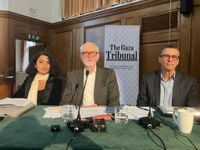As rain swept across London on September 4, 2025, a gathering unlike any other unfolded in the heart of Westminster. Campaigners, lawyers, public figures, and witnesses assembled for the opening of the Gaza Tribunal—a two-day people’s court convened to scrutinize the British government’s alleged complicity in Israeli war crimes against Palestinians in the Gaza Strip. The event, spearheaded by independent MP Jeremy Corbyn, marked a pivotal moment in the ongoing debate over the United Kingdom’s role in the conflict, following nearly two years of mass anti-genocide protests and a formal request for a public inquiry that Parliament had decisively blocked just months earlier.
The tribunal’s origins trace back to a bill tabled by Corbyn on June 4, 2025, in the House of Commons. The legislation, supported by dozens of MPs and more than 20 aid groups, called for an independent inquiry into the UK’s involvement in Israeli military operations in Gaza, including the supply of weapons, surveillance aircraft, and the use of Royal Air Force bases. Despite mounting public pressure and the gravity of the allegations, the measure was ultimately blocked by Prime Minister Keir Starmer’s Labour government in July. The government’s refusal to act, many say, left campaigners with no choice but to launch their own inquiry. "If the government won’t organise a public open inquiry, if Parliament won’t effectively inquire into what’s going on, it remains for us to do it," Corbyn asserted, according to Al Jazeera. "This [event] will strengthen our arguments both in Parliament and outside … An awful lot of what’s going on is completely illegal and shouldn’t be hidden from."
Since October 2023, when Israel launched its latest military campaign in Gaza following Hamas attacks that killed an estimated 1,200 people in southern Israel, reports have accumulated detailing the UK’s alleged complicity. These include continued exports of F-35 jet parts—vital components used in bombings of schools and hospitals—and intelligence sharing that, critics argue, facilitated attacks on civilian infrastructure. The death toll in Gaza has soared past 64,000, according to figures cited by Al Jazeera, with many more injured or displaced.
Testimonies at the tribunal painted a grim and deeply personal picture of the devastation. Dr. Nick Maynard, a British surgeon who has volunteered in Gaza several times, recounted operating on children as young as 11 or 12 who had been "clearly targeted with shootings to the abdomen and the chest." On one harrowing occasion at Nasser Hospital, Maynard described a group of teenagers, aged 13 to 14, brought in with gunshot wounds to the testicles. "The pattern of the targeting of specific body parts was something we all recognised," he told Al Jazeera. "Explained by what I describe as target practice by the Israeli soldiers."
Maynard’s testimony didn’t stop at gunshot wounds. He told the tribunal about seven-month-old Zaynab, who died of malnutrition after Israeli guards deliberately removed infant formula brought in by US doctors, despite a known shortage. "You could see every rib, every bone in her body," Maynard recalled. "She was being fed with water mixed with sugar. We had completely run out of formula feed in Nasser [hospital]. That formula feed may have saved Zaynab." The calculated nature of these attacks, according to Maynard and others, pointed to an intent to exterminate and ethnically cleanse Gaza—a charge echoed by many who spoke at the event.
Abubaker Abed, a media worker forced to flee Gaza under Israeli threats, placed the ongoing assault in the context of decades of occupation. Legal experts, including UN Special Rapporteur Francesca Albanese, contributed to the proceedings. Albanese stopped short of alleging direct complicity in war crimes but stated, "States including the UK have been on notice for decades of their obligations, and they have not acted accordingly," highlighting Israel’s "longstanding structural system of widespread and systemic oppression and exploitation against the Palestinians that has turned genocidal."
The tribunal’s panel was diverse, comprising UN specialists, Palestinian journalists, lawmakers, and campaigners. Labour lawmaker Richard Burgon was unequivocal in his assessment: "Some governments, including the UK, are helping to arm Israel. That’s one form of complicity." He added, "I would argue that they [the UK government] are also complicit through the political green lights that they give Israel." Burgon insisted that the UK should have used "every single tool at its disposal, from sanctions … to using its role in the UN and elsewhere to force, not plead with Israel, to stop," drawing a pointed comparison with the UK’s approach to Russia’s war on Ukraine.
Despite the gravity of these allegations and the mounting evidence, the British government has maintained its support for Israel, both diplomatically and militarily. The UK continues to supply F-35 components through the global pool programme and flies surveillance planes over Gaza, raising questions about intelligence sharing. Meanwhile, diplomatic ties remain strong: Israeli Prime Minister Isaac Herzog is scheduled to visit the UK next week, as reported by The Guardian.
For many campaigners, the government’s inaction is compounded by its stance on solidarity movements at home. Instead of addressing the substance of the allegations, critics argue, Britain and other European governments have focused on criminalizing Palestine solidarity activism. As Corbyn wrote in The Morning Star, "Israel has not been able to carry out these atrocities alone. Instead, it has relied on the military, economic and political support from governments around the world, including our own." He drew a direct parallel to the Iraq War: "Just like Iraq, the government is doing everything it can to protect itself from scrutiny … We will uncover the full scale of British complicity in genocide – and we will bring about justice for the people of Palestine."
Public sentiment appears to be shifting. Ben Jamal, head of the Palestine Solidarity Campaign, observed a "fundamental shift in public opinion," noting that "Israel is more isolated in the court of public opinion, but none of that has been able to shift the dynamics of government behaviour." On Saturday, September 6, thousands are expected to join pro-Palestine marches across the country, highlighting the growing disconnect between public outrage and official policy.
Health workers have also made their voices heard. Victoria Rose, a British surgeon who volunteered in Gaza, first wrote to Prime Minister Starmer in November 2024, urging action. She and other doctors were eventually invited to speak with the premier via Zoom after media appearances in June 2025, but, as she told the tribunal, "Not that we’ve been informed of, no," when asked if the meetings had led to any proactive government action.
The Gaza Tribunal, which concluded its hearings on September 5, 2025, has brought renewed attention to Britain’s role in the ongoing conflict. Whether its findings will translate into meaningful change remains to be seen. For now, the testimonies of survivors, health workers, and campaigners have ensured that the debate over British complicity in Gaza’s suffering is far from settled.


